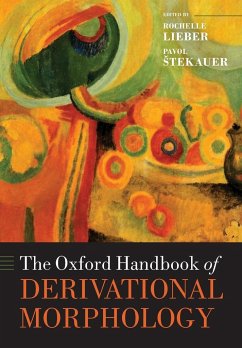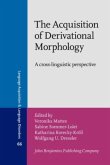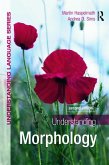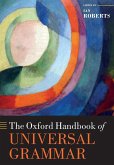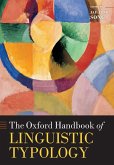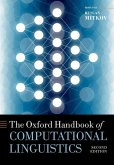The Oxford Handbook of Derivational Morphology
Herausgeber: Lieber, Rochelle; Stekauer, Pavol
The Oxford Handbook of Derivational Morphology
Herausgeber: Lieber, Rochelle; Stekauer, Pavol
- Broschiertes Buch
- Merkliste
- Auf die Merkliste
- Bewerten Bewerten
- Teilen
- Produkt teilen
- Produkterinnerung
- Produkterinnerung
This book provides a comprehensive and thorough overview of the study of derivational morphology. Chapters cover theoretical and definitional matters, formal and semantic issues, interdisciplinary connections, and detailed descriptions of derivational processes in a wide range of language families.
Andere Kunden interessierten sich auch für
![The Acquisition of Derivational Morphology The Acquisition of Derivational Morphology]() The Acquisition of Derivational Morphology106,99 €
The Acquisition of Derivational Morphology106,99 €![Understanding Morphology Understanding Morphology]() Martin HaspelmathUnderstanding Morphology64,99 €
Martin HaspelmathUnderstanding Morphology64,99 €![The Oxford Handbook of Names and Naming The Oxford Handbook of Names and Naming]() The Oxford Handbook of Names and Naming64,99 €
The Oxford Handbook of Names and Naming64,99 €![The Oxford Handbook of Universal Grammar The Oxford Handbook of Universal Grammar]() The Oxford Handbook of Universal Grammar60,99 €
The Oxford Handbook of Universal Grammar60,99 €![The Oxford Handbook of Linguistic Typology The Oxford Handbook of Linguistic Typology]() The Oxford Handbook of Linguistic Typology70,99 €
The Oxford Handbook of Linguistic Typology70,99 €![The Oxford Handbook of Computational Linguistics The Oxford Handbook of Computational Linguistics]() The Oxford Handbook of Computational Linguistics317,99 €
The Oxford Handbook of Computational Linguistics317,99 €![The Oxford Handbook of Megaproject Management The Oxford Handbook of Megaproject Management]() The Oxford Handbook of Megaproject Management57,99 €
The Oxford Handbook of Megaproject Management57,99 €-
-
-
This book provides a comprehensive and thorough overview of the study of derivational morphology. Chapters cover theoretical and definitional matters, formal and semantic issues, interdisciplinary connections, and detailed descriptions of derivational processes in a wide range of language families.
Hinweis: Dieser Artikel kann nur an eine deutsche Lieferadresse ausgeliefert werden.
Hinweis: Dieser Artikel kann nur an eine deutsche Lieferadresse ausgeliefert werden.
Produktdetails
- Produktdetails
- Oxford Handbooks
- Verlag: Oxford University Press
- Seitenzahl: 956
- Erscheinungstermin: 24. August 2017
- Englisch
- Abmessung: 244mm x 170mm x 51mm
- Gewicht: 1714g
- ISBN-13: 9780198808626
- ISBN-10: 0198808623
- Artikelnr.: 48247215
- Herstellerkennzeichnung
- Libri GmbH
- Europaallee 1
- 36244 Bad Hersfeld
- gpsr@libri.de
- Oxford Handbooks
- Verlag: Oxford University Press
- Seitenzahl: 956
- Erscheinungstermin: 24. August 2017
- Englisch
- Abmessung: 244mm x 170mm x 51mm
- Gewicht: 1714g
- ISBN-13: 9780198808626
- ISBN-10: 0198808623
- Artikelnr.: 48247215
- Herstellerkennzeichnung
- Libri GmbH
- Europaallee 1
- 36244 Bad Hersfeld
- gpsr@libri.de
Rochelle Lieber is Professor of Linguistics at the University of New Hampshire. Her interests include morphological theory, lexical semantics, and the morphology-syntax interface. She is the author of several books including Morphology and Lexical Semantics (CUP, 2004), Introducing Morphology (CUP, 2010) and, with Laurie Bauer and Ingo Plag, The Oxford Reference Guide to English Morphology (OUP, 2013). Pavol %Stekauer is Professor of English linguistics at P.J. %Safárik University, Koice. His research has focused on an onomasiological approach to word-formation. His publications include An Onomasiological Theory of English Word-Formation (Benjamins, 1998), Meaning Predictability in Word-Formation (Benjamins, 2005), and Word-Formating in the World's Languages. A Typological Survey (with Valerie and Körtvélyessy: CUP, 2012). Rochelle Lieber and Pavol %Stekauer are co-editors of two handbooks: The Handbook of Word-formation (Springer, 2005) and The Oxford Handbook of Compounding (OUP, 2009).
* Part I * 1: Rochelle Lieber and Pavol
tekauer: Introduction: The Scope of the Handbook * 2: Pius ten Hacken: Delineating Derivation and Inflection * 3: Susan Olsen: Delineating Derivation and Compounding * 4: Rochelle Lieber: Theoretical Approaches to Derivation * 5: Mark Aronoff and Mark Lindsay: Productivity, Blocking, and Lexicalization * 6: Rochelle Lieber: Methodological Issues in Studying Derivation * 7: Harald Baayen: Experimental and Psycholinguistic Approaches * 8: Laurie Bauer: Concatenative Derivation * 9: Juliette Blevins: Infixation * 10: Salvador Valera: Conversion * 11: Sharon Inkelas: Non-concatenative Derivation: Reduplication * 12: Stuart Davis and Natsuko Tsujimura: Non-concatenative Derivation: Other Processes * 13: Mary Paster: Allomorphy * 14: Artemis Alexiadou: Nominal Derivation * 15: Andrew Koontz-Garboden: Verbal Derivation * 16: Antonio Fábregas: Adjectival and Adverbial Derivation * 17: Livia Körtvélyessy: Evaluative Derivation * 18: Gregory Stump: Derivation and Function Words * 19: Franz Rainer: Polysemy in Derivation * 20: Pavol
tekauer: Derivational Paradigms * 21: Pauliina Saarinen and Jennifer Hay: Affix Ordering in Derivation * 22: Carola Trips: Derivation and Historical Change * 23: Livia Körtvélyessy and Pavol
tekauer: Derivation in a Social Context * 24: Eve V. Clark: Acquisition of Derivational Morphology * Part II * 25: Pingali Sailaja: Indo-European * 26: Ferenc Kiefer and Johanna Laakso: Uralic * 27: Irina Nikolaeva: Altaic * 28: Edward J. Vajda: Yeniseian * 29: Mark J. Alves: Mon-Khmer * 30: Robert Blust: Austronesian * 31: Denis Creissels: Niger-Congo * 32: Erin Shay: Afro-Asiatic * 33: Gerrit J. Dimmendaal: Nilo-Saharan * 34: Karen Steffen Chung, Nathan W. Hill, and Jackson T.-S. Sun: Sino-Tibetan * 35: Jane Simpson: Pama-Nyungan * 36: Keren Rice: Athabaskan * 37: Alana Johns: Eskimo-Aleut * 38: Gabriela Caballero: Uto-Aztecan * 39: Verónica Nercesian: Mataguayan * 40: Bernd Heine: Areal Tendencies in Derivation * 41: Rochelle Lieber and Pavol
tekauer: Universals in Derivation * References * Language Index * Name Index * Subject Index
tekauer: Introduction: The Scope of the Handbook * 2: Pius ten Hacken: Delineating Derivation and Inflection * 3: Susan Olsen: Delineating Derivation and Compounding * 4: Rochelle Lieber: Theoretical Approaches to Derivation * 5: Mark Aronoff and Mark Lindsay: Productivity, Blocking, and Lexicalization * 6: Rochelle Lieber: Methodological Issues in Studying Derivation * 7: Harald Baayen: Experimental and Psycholinguistic Approaches * 8: Laurie Bauer: Concatenative Derivation * 9: Juliette Blevins: Infixation * 10: Salvador Valera: Conversion * 11: Sharon Inkelas: Non-concatenative Derivation: Reduplication * 12: Stuart Davis and Natsuko Tsujimura: Non-concatenative Derivation: Other Processes * 13: Mary Paster: Allomorphy * 14: Artemis Alexiadou: Nominal Derivation * 15: Andrew Koontz-Garboden: Verbal Derivation * 16: Antonio Fábregas: Adjectival and Adverbial Derivation * 17: Livia Körtvélyessy: Evaluative Derivation * 18: Gregory Stump: Derivation and Function Words * 19: Franz Rainer: Polysemy in Derivation * 20: Pavol
tekauer: Derivational Paradigms * 21: Pauliina Saarinen and Jennifer Hay: Affix Ordering in Derivation * 22: Carola Trips: Derivation and Historical Change * 23: Livia Körtvélyessy and Pavol
tekauer: Derivation in a Social Context * 24: Eve V. Clark: Acquisition of Derivational Morphology * Part II * 25: Pingali Sailaja: Indo-European * 26: Ferenc Kiefer and Johanna Laakso: Uralic * 27: Irina Nikolaeva: Altaic * 28: Edward J. Vajda: Yeniseian * 29: Mark J. Alves: Mon-Khmer * 30: Robert Blust: Austronesian * 31: Denis Creissels: Niger-Congo * 32: Erin Shay: Afro-Asiatic * 33: Gerrit J. Dimmendaal: Nilo-Saharan * 34: Karen Steffen Chung, Nathan W. Hill, and Jackson T.-S. Sun: Sino-Tibetan * 35: Jane Simpson: Pama-Nyungan * 36: Keren Rice: Athabaskan * 37: Alana Johns: Eskimo-Aleut * 38: Gabriela Caballero: Uto-Aztecan * 39: Verónica Nercesian: Mataguayan * 40: Bernd Heine: Areal Tendencies in Derivation * 41: Rochelle Lieber and Pavol
tekauer: Universals in Derivation * References * Language Index * Name Index * Subject Index
* Part I * 1: Rochelle Lieber and Pavol
tekauer: Introduction: The Scope of the Handbook * 2: Pius ten Hacken: Delineating Derivation and Inflection * 3: Susan Olsen: Delineating Derivation and Compounding * 4: Rochelle Lieber: Theoretical Approaches to Derivation * 5: Mark Aronoff and Mark Lindsay: Productivity, Blocking, and Lexicalization * 6: Rochelle Lieber: Methodological Issues in Studying Derivation * 7: Harald Baayen: Experimental and Psycholinguistic Approaches * 8: Laurie Bauer: Concatenative Derivation * 9: Juliette Blevins: Infixation * 10: Salvador Valera: Conversion * 11: Sharon Inkelas: Non-concatenative Derivation: Reduplication * 12: Stuart Davis and Natsuko Tsujimura: Non-concatenative Derivation: Other Processes * 13: Mary Paster: Allomorphy * 14: Artemis Alexiadou: Nominal Derivation * 15: Andrew Koontz-Garboden: Verbal Derivation * 16: Antonio Fábregas: Adjectival and Adverbial Derivation * 17: Livia Körtvélyessy: Evaluative Derivation * 18: Gregory Stump: Derivation and Function Words * 19: Franz Rainer: Polysemy in Derivation * 20: Pavol
tekauer: Derivational Paradigms * 21: Pauliina Saarinen and Jennifer Hay: Affix Ordering in Derivation * 22: Carola Trips: Derivation and Historical Change * 23: Livia Körtvélyessy and Pavol
tekauer: Derivation in a Social Context * 24: Eve V. Clark: Acquisition of Derivational Morphology * Part II * 25: Pingali Sailaja: Indo-European * 26: Ferenc Kiefer and Johanna Laakso: Uralic * 27: Irina Nikolaeva: Altaic * 28: Edward J. Vajda: Yeniseian * 29: Mark J. Alves: Mon-Khmer * 30: Robert Blust: Austronesian * 31: Denis Creissels: Niger-Congo * 32: Erin Shay: Afro-Asiatic * 33: Gerrit J. Dimmendaal: Nilo-Saharan * 34: Karen Steffen Chung, Nathan W. Hill, and Jackson T.-S. Sun: Sino-Tibetan * 35: Jane Simpson: Pama-Nyungan * 36: Keren Rice: Athabaskan * 37: Alana Johns: Eskimo-Aleut * 38: Gabriela Caballero: Uto-Aztecan * 39: Verónica Nercesian: Mataguayan * 40: Bernd Heine: Areal Tendencies in Derivation * 41: Rochelle Lieber and Pavol
tekauer: Universals in Derivation * References * Language Index * Name Index * Subject Index
tekauer: Introduction: The Scope of the Handbook * 2: Pius ten Hacken: Delineating Derivation and Inflection * 3: Susan Olsen: Delineating Derivation and Compounding * 4: Rochelle Lieber: Theoretical Approaches to Derivation * 5: Mark Aronoff and Mark Lindsay: Productivity, Blocking, and Lexicalization * 6: Rochelle Lieber: Methodological Issues in Studying Derivation * 7: Harald Baayen: Experimental and Psycholinguistic Approaches * 8: Laurie Bauer: Concatenative Derivation * 9: Juliette Blevins: Infixation * 10: Salvador Valera: Conversion * 11: Sharon Inkelas: Non-concatenative Derivation: Reduplication * 12: Stuart Davis and Natsuko Tsujimura: Non-concatenative Derivation: Other Processes * 13: Mary Paster: Allomorphy * 14: Artemis Alexiadou: Nominal Derivation * 15: Andrew Koontz-Garboden: Verbal Derivation * 16: Antonio Fábregas: Adjectival and Adverbial Derivation * 17: Livia Körtvélyessy: Evaluative Derivation * 18: Gregory Stump: Derivation and Function Words * 19: Franz Rainer: Polysemy in Derivation * 20: Pavol
tekauer: Derivational Paradigms * 21: Pauliina Saarinen and Jennifer Hay: Affix Ordering in Derivation * 22: Carola Trips: Derivation and Historical Change * 23: Livia Körtvélyessy and Pavol
tekauer: Derivation in a Social Context * 24: Eve V. Clark: Acquisition of Derivational Morphology * Part II * 25: Pingali Sailaja: Indo-European * 26: Ferenc Kiefer and Johanna Laakso: Uralic * 27: Irina Nikolaeva: Altaic * 28: Edward J. Vajda: Yeniseian * 29: Mark J. Alves: Mon-Khmer * 30: Robert Blust: Austronesian * 31: Denis Creissels: Niger-Congo * 32: Erin Shay: Afro-Asiatic * 33: Gerrit J. Dimmendaal: Nilo-Saharan * 34: Karen Steffen Chung, Nathan W. Hill, and Jackson T.-S. Sun: Sino-Tibetan * 35: Jane Simpson: Pama-Nyungan * 36: Keren Rice: Athabaskan * 37: Alana Johns: Eskimo-Aleut * 38: Gabriela Caballero: Uto-Aztecan * 39: Verónica Nercesian: Mataguayan * 40: Bernd Heine: Areal Tendencies in Derivation * 41: Rochelle Lieber and Pavol
tekauer: Universals in Derivation * References * Language Index * Name Index * Subject Index

